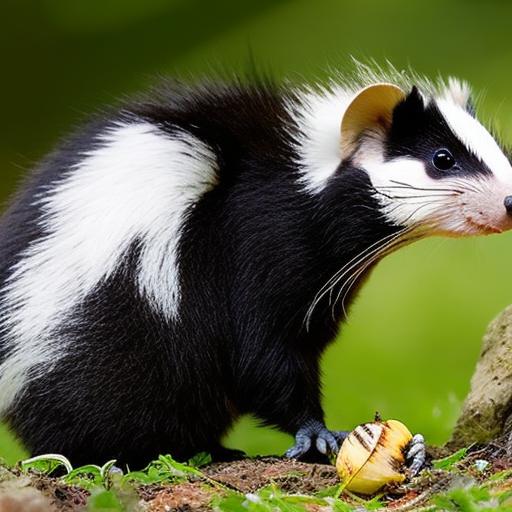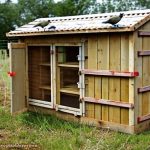Skunks are small mammals known for their distinctive black and white fur and their ability to spray a foul-smelling liquid as a defense mechanism. While skunks may seem harmless, they can pose a threat to chickens and other small animals. Skunks are omnivores, meaning they eat both plants and animals, and they have been known to prey on chickens and their eggs. This can be a major concern for chicken owners, as skunks can cause significant damage to a flock if left unchecked.
Key Takeaways
- Skunks can pose a potential threat to chickens and their eggs.
- Understanding skunk behavior and habits can help prevent infestations.
- Signs of skunk activity near your chicken coop include digging and strong odors.
- Creating a skunk-proof chicken coop and properly storing chicken feed can prevent infestations.
- Natural repellents, motion-activated lights and alarms, and trapping can help deter and remove skunks.
Understanding Skunk Behavior and Habits
Skunks are primarily nocturnal animals, meaning they are most active at night. They are also solitary creatures, preferring to live alone rather than in groups. Skunks are opportunistic feeders and will eat whatever food is readily available to them. This includes insects, small mammals, fruits, vegetables, and even garbage. Skunks are attracted to chicken coops because they provide a reliable source of food in the form of eggs and young chicks.
Identifying Signs of Skunk Activity Near Your Chicken Coop
It is important for chicken owners to be able to identify signs of skunk activity near their coop in order to take appropriate action. Some common signs of skunk activity include:
1. Strong odor: Skunks have a distinct smell that is often described as musky or pungent. If you notice a strong odor near your chicken coop, it could be a sign that skunks are present.
2. Digging: Skunks are known for their ability to dig, and they may dig holes around your chicken coop in search of food or shelter.
3. Missing eggs or chicks: If you notice that eggs or chicks are missing from your coop without any obvious signs of predation, it could be a sign that skunks are responsible.
It is important to catch skunk activity early in order to prevent further damage to your flock. Skunks can quickly become a nuisance and can cause significant harm to your chickens if left unchecked.
Creating a Skunk-Proof Chicken Coop
| Metrics | Values |
|---|---|
| Number of Skunk Attacks | 0 |
| Number of Chickens Lost to Skunks | 0 |
| Cost of Building Skunk-Proof Coop | 500 |
| Time Spent Building Coop | 20 hours |
| Number of Skunk Sightings Near Coop | 3 |
Prevention is key when it comes to protecting your chickens from skunks. There are several steps you can take to make your chicken coop skunk-proof:
1. Secure entrances: Skunks are excellent diggers and can easily burrow under fences or into chicken coops. Make sure all entrances to your coop are secure and that there are no gaps or holes for skunks to enter through.
2. Install hardware cloth: Hardware cloth is a type of wire mesh that is more durable than regular chicken wire. Use hardware cloth to cover any openings in your coop, such as windows or vents, to prevent skunks from gaining access.
3. Elevate the coop: Elevating your chicken coop off the ground can make it more difficult for skunks to access. Consider raising the coop on stilts or placing it on a platform to deter skunks from getting inside.
By taking these preventative measures, you can greatly reduce the risk of skunks infiltrating your chicken coop and harming your flock.
Choosing the Right Chicken Feed to Avoid Attracting Skunks
The type of chicken feed you choose can also play a role in attracting or deterring skunks. Skunks are attracted to the smell of food, so it is important to choose a feed that does not have a strong odor that could attract them. Look for chicken feeds that are low in odor and contain natural ingredients.
Avoid using feeds that contain fish meal or other strong-smelling ingredients, as these can be particularly attractive to skunks. Instead, opt for feeds that are made with grains and vegetables, as these tend to have a milder scent.
Properly Storing Chicken Feed to Prevent Skunk Infestation

In addition to choosing the right chicken feed, it is important to store it properly to prevent skunk infestation. Skunks have a keen sense of smell and can easily detect food sources, even if they are stored in sealed containers. To prevent skunks from being attracted to your chicken feed, follow these tips:
1. Store feed in airtight containers: Use airtight containers to store your chicken feed, such as metal or plastic bins with tight-fitting lids. This will help to keep the smell of the feed contained and prevent skunks from being able to detect it.
2. Keep feed in a secure location: Store your chicken feed in a secure location, such as a locked shed or garage, to prevent skunks from gaining access. Make sure the area is well-ventilated and free from any potential entry points for skunks.
3. Clean up spills and leftovers: Skunks are attracted to any food source, so it is important to clean up any spills or leftovers from your chicken feed. This will help to eliminate any potential attractants for skunks and reduce the risk of infestation.
By properly storing your chicken feed, you can greatly reduce the likelihood of attracting skunks to your property.
Using Natural Skunk Repellents to Keep Them Away from Your Chickens
There are several natural repellents that can be used to deter skunks from your chicken coop. These repellents work by creating an unpleasant scent or taste that skunks find unappealing. Some natural skunk repellents include:
1. Ammonia: Skunks are sensitive to strong odors, so placing ammonia-soaked rags or cotton balls around your coop can help to deter them. Be sure to place the ammonia in areas where skunks are likely to enter or dig.
2. Citrus peels: Skunks dislike the smell of citrus, so placing citrus peels around your coop can help to keep them away. Replace the peels regularly to maintain their effectiveness.
3. Hot pepper spray: Skunks have a sensitive sense of taste, so spraying a mixture of hot peppers and water around your coop can help to deter them. Be sure to reapply the spray after rain or heavy dew.
These natural repellents can be effective in deterring skunks from your chicken coop, but it is important to remember that they may need to be reapplied regularly to maintain their effectiveness.
Installing Motion-Activated Lights and Alarms to Deter Skunks
Motion-activated lights and alarms can be an effective deterrent for skunks. Skunks are nocturnal animals and are often startled by sudden bright lights or loud noises. By installing motion-activated lights and alarms near your chicken coop, you can startle skunks and discourage them from approaching.
When installing motion-activated lights and alarms, be sure to place them in areas where skunks are likely to enter or dig. This could include entrances to your coop, paths leading to the coop, or areas where skunks have been seen before.
Trapping and Removing Skunks from Your Property
If you have tried all of the above methods and are still experiencing issues with skunks, you may need to resort to trapping and removing them from your property. It is important to note that trapping and removing skunks should only be done as a last resort and should be done safely and humanely.
When trapping skunks, it is important to use live traps that are specifically designed for capturing small mammals. These traps should be baited with food that skunks find appealing, such as canned cat food or peanut butter. Once the skunk is trapped, it should be released in a suitable location away from your property.
It is important to check local regulations before trapping and removing skunks, as some areas may require a permit or have specific guidelines for trapping and relocation.
Protecting Your Flock from Skunks Requires Diligence and Care
In conclusion, skunks can pose a threat to chickens and their eggs, but with proper precautions, you can protect your flock from these unwanted visitors. By understanding skunk behavior and habits, identifying signs of skunk activity, and taking preventative measures such as creating a skunk-proof coop and choosing the right chicken feed, you can greatly reduce the risk of skunk infestation.
Additionally, using natural skunk repellents, installing motion-activated lights and alarms, and trapping and removing skunks as a last resort can help to further deter these pests. Remember to always prioritize the safety and well-being of your flock when dealing with skunks or any other potential threats. With diligence and care, you can keep your chickens safe from skunks and enjoy the benefits of a healthy and thriving flock.
If you’re looking for ways to protect your chickens from skunks, you might also be interested in an article on how to insulate a chicken coop. Insulating your coop can help regulate the temperature inside, keeping your chickens warm in the winter and cool in the summer. It can also help keep out unwanted visitors like skunks. Check out this helpful guide on how to insulate a chicken coop for more information and tips.
FAQs
What are skunks?
Skunks are small mammals known for their distinctive black and white striped fur and their ability to spray a strong, unpleasant odor as a defense mechanism.
Why do skunks attack chickens?
Skunks are omnivores and will eat a variety of foods, including insects, small mammals, and eggs. Chickens and their eggs are a common target for skunks.
What are the dangers of skunks attacking chickens?
Skunks can kill chickens and other small animals, and their presence can also spread diseases such as rabies and distemper.
How can I keep skunks away from my chickens?
There are several methods for keeping skunks away from chickens, including securing the chicken coop with sturdy fencing and locking doors, removing any food sources that may attract skunks, and using natural deterrents such as predator urine or bright lights.
What should I do if I encounter a skunk?
If you encounter a skunk, it is important to remain calm and avoid startling or threatening the animal. Skunks will typically only spray as a last resort, so slowly backing away and giving the skunk plenty of space is the best course of action. If you are sprayed by a skunk, there are several home remedies and commercial products that can help remove the odor.
Meet Walter, the feathered-friend fanatic of Florida! Nestled in the sunshine state, Walter struts through life with his feathered companions, clucking his way to happiness. With a coop that’s fancier than a five-star hotel, he’s the Don Juan of the chicken world. When he’s not teaching his hens to do the cha-cha, you’ll find him in a heated debate with his prized rooster, Sir Clucks-a-Lot. Walter’s poultry passion is no yolk; he’s the sunny-side-up guy you never knew you needed in your flock of friends!







